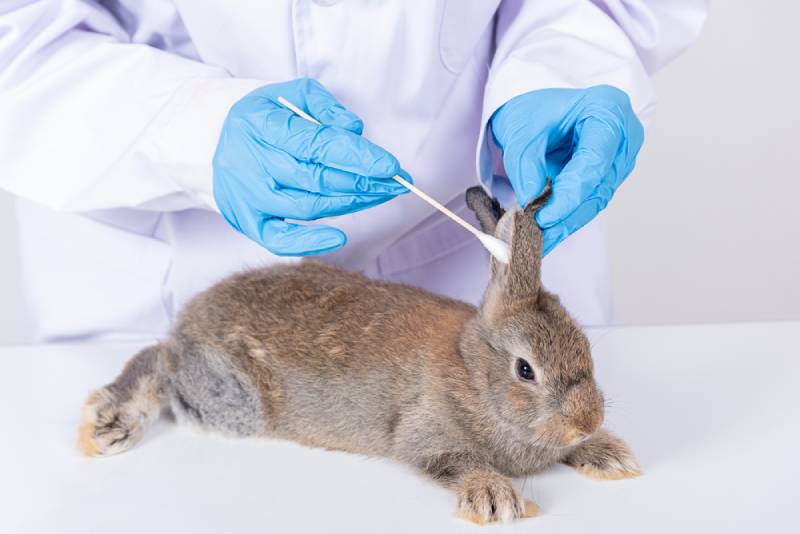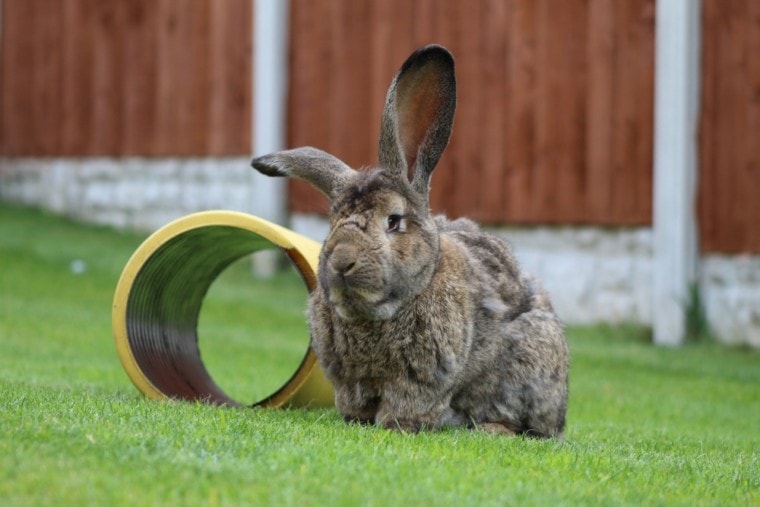
Click to Skip Ahead
The Continental Giant Rabbit is instantly recognizable by rabbit lovers everywhere due to its massive size and mandolin-shaped body. The name might be misleading, as there are technically two types of Continental Giant—the white and colored, but both branch from the Flemish Giant breed.
So, what is this breed all about, and what is it like to own one? You’ll be incredibly interested due to its companionship qualities and extremely docile nature. These rabbits make the best pets for folks with experience and adequate space.
Breed Overview
Size:
Giant
Weight:
15+ pounds
Lifespan:
4–5 years
Similar Breeds:
Flemish Giant, Spanish Giant
Suitable for:
Experienced rabbit owners, those with available space
Temperament:
Gentle, docile, friendly
The Continental Giant rabbit was considered the largest rabbit breed in the world, though the Flemish Giant is maxing out at a slightly higher weight overall. The Conti remains in close range of other giant rabbits, like Spanish and British varieties.
Continental Giant Rabbit Breed Characteristics
 How Much Do These Rabbits Cost?
How Much Do These Rabbits Cost?
If you go to a pet store to check out rabbit prices, you will likely see them ranging from $30 to $80. Due to the rarity and size of the Continental Giant rabbit breed, they tend to cost a lot more money. If you want to purchase one of these beauties from a breeder, you can expect to pay between $300 and $500 per bunny.
You can look locally for breeders, but finding one of these rabbits might require travel. Some breeders will offer to ship rabbits to you for additional fees. Choose the method that works best for you based on availability.

Temperament & Intelligence of the Continental Giant Rabbit
The Continental Giant rabbit is known for being a very docile, easy-to-manage rabbit breed. Since they are so lovable, affectionate, and easygoing, they can make tremendous additions to various lifestyles. A continental giant will impress you with its overall intelligence, capable of learning multiple commands and tricks.
Do These Rabbits Make Good Pets?👪
In the right circumstances, a Continental Giant can make a wonderful pet. Because of their very amiable and gentle nature, they are extremely good with children. However, they are enormous, and proper handling is a must.
Children must learn very early how to and when to handle these particular rabbits. Most smaller children will struggle to hold and support them appropriately. Constant supervision is a must for the safety of both your child and the rabbit. Since rabbits have such sensitive spines, they can get injured very easily.
Does This Rabbit Get Along With Other Pets?
The Continental Giant can get along very well with other pets. If you’re looking for a rabbit that can acclimate well with your cats and dogs, this breed won’t disappoint. On that note, rabbits also need the company of other rabbit friends. You should always have more than one, so your pal doesn’t get lonely.
If you have an animal in your home that torments your rabbit, it can lead to health problems and aggressive tendencies. Keep in mind that your Continental Giant can get injured quite easily. They also might scare, causing extreme stress or even heart failure.
So always ensure the animals in your home are compatible with one another before you allow them to interact.
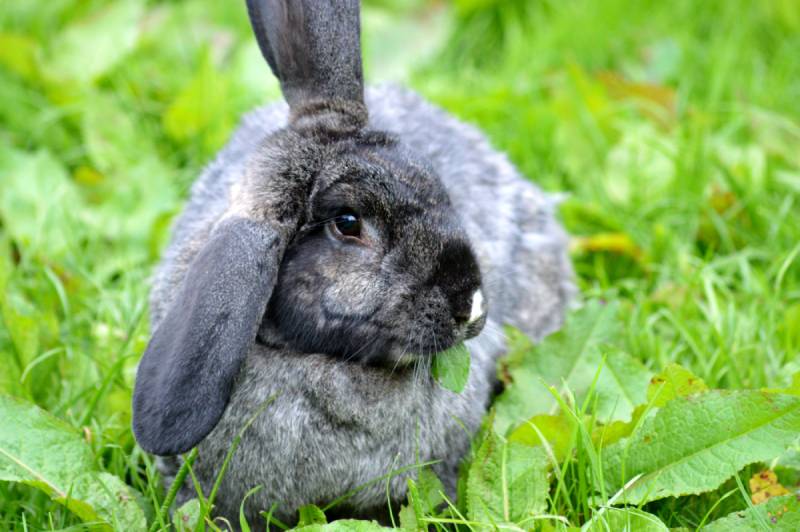
Things to Know When Owning a Continental Giant Rabbit:
Food & Diet Requirements🥕
Your Flemish giant requires a well-rounded diet that consists mainly of commercial pellets and hay. You must also supplement them with fresh fruits and vegetables to reap all the benefits of raw nutrition.
You can feed juvenile rabbits an assortment of fruits and veggies in addition to their regular pellets after they reach 4 months of age. Despite how much food you provide, you should always ensure they have a proper exercise outlet to avoid weight gain.
This is a gigantic rabbit breed, meaning they will need substantial food to sustain themselves. On average, an adult Conti will eat 6 to 12 cups of high-quality pellets per day. Always keep a plentiful supply of hay on hand to keep your big guy healthy. You can expect to double these measurements if you have a pregnant or nursing doe.
On top of that, you should always provide an unlimited hay source, so they have a constant supply of fiber. They must be able to file down their teeth and take this fiber source to keep the gastrointestinal tract pH balanced.
Habitat & Hutch Requirements🏠
Hutch size is where most people run into issues. You’ll want to have enough space for your Conti, and some people don’t have the extra square footage to spare. A giant rabbit needs at least a 12 by 12-foot enclosure. It helps if you have a large shed or other setup.
Many people choose to have a Conti as a house rabbit. In this case, you still need somewhere to keep your rabbit while you’re away from home or during night hours when no one is awake.
So just know they need their own enclosure space even if you have your Conti free-ranging most of the time. Rabbits left to their own devices, especially one as large and potentially destructive as a Continental Giant, require confinement when you can’t supervise.
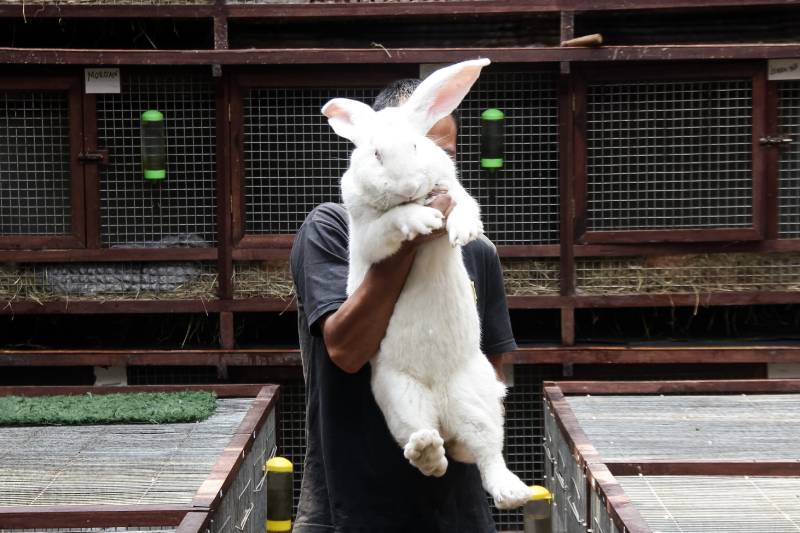
Exercise & Sleeping Needs🐇
No matter how much space your Continental Giant has in their enclosure, they still need time to run and play. You can easily let your bunny run across to your home, permitting they’re under your direct supervision.
You can interact with tons of fun activities with them, such as offering tunnels, chew toys, and lots and lots of hay!
When it’s time for a snooze, whether you let your Continental Giant free room all day long, they need an enclosure to keep them safe at night. Make sure to give them a quiet, cozy crate to nest in so they feel safe and secluded.
Training 🥎
One really interesting thing about the Continental Giant rabbit is that you can train them very quickly. You can potty train these rabbits to go to the bathroom outside or in a litter box.
These intelligent rabbits pick up on concepts, especially if you start from a very early age.
You can also train these rabbits to walk on a leash and harness. So, while everyone else is out walking their dogs, you can sport your rabbit around. This is much more successful if you do it from the time you purchase it as a juvenile.
Consider any environmental triggers if you choose to walk your rabbit on a leash. Like all rabbits, the Continental Giant can spook quite easily, leading to extreme distress and even heart attacks.
Plus, if they are strong and have very short front limbs, they can slip out of harnesses easily if they don’t fit properly.

Grooming✂️
Grooming is an integral part of care for any rabbit. Here are some different areas of care and how you can accommodate your Continental Giant.
Brushing
While rabbits are usually very good at self-grooming, they can use our help occasionally. You can guarantee that sometimes it will be necessary for you to brush your rabbit. Sometimes, our rabbits start to shed in bulk, losing tufts of fur.
However, if our bunnies try to groom themselves and ingest these large bits of fur, it can affect their GI tract. One of the most troubling issues of this behavior is the development of GI stasis.
You can help your rabbit out by gently plucking out the tufts of fur. If your rabbit resists, you can gently pet them, slowly pulling out the tufts as you pass over their fur. Many bunnies love being brushed as well. So, you can buy a small, rabbit-friendly brush and gently collect the shed.
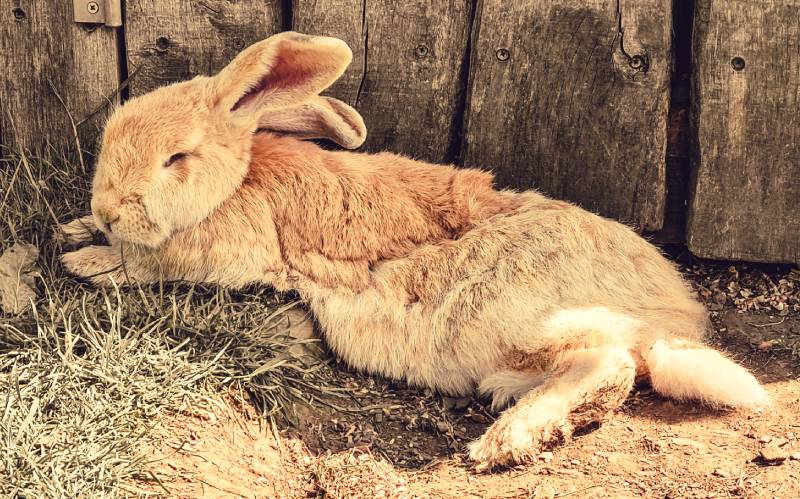
Nail Clipping
Rabbits are big-time diggers. In the wild, their nails naturally wear down due to the different substrates and terrain they encounter daily. They are not going to get the same textures in the home.
That is why it is imperative to clip your rabbit’s nails regularly to avoid damaging your furniture and carpets.
Protecting Hocks
Your Continental Giant’s hocks can be very sensitive. You can line frequently used spaces with fleece blankets and other soft materials to protect their hocks and keep them from getting sore.
If your Conti has a litter box, you can disperse hay over the litter box and bedding to create a layer of comfort as well. The entire idea is to keep your rabbit’s hocks free of moisture as much as possible.
If your rabbit has saturated or sore hocks, it can lead to infection, so it’s imperative to prevent it.
Dental Health
To ensure that your rabbits have excellent dental health, all you need to do is ensure they have a fresh supply of hay at all times.
Your rabbit constantly munching on this food substance allows them to not only get a favorable amount of fiber in their diet, but it also wears down their teeth to an optimal level.
Lifespan and Health Conditions🏥
One of the downsides of a Continental Giant rabbit is that they don’t live very long lifespans. In contrast to many other rabbit breeds, they have a relatively short lifespan, lasting roughly 4 to 6 years.
Male vs. Female
While being a male or female generally has nothing to do with overall personality, rabbits have major differences between sexes. For example, males tend to be a lot calmer and easier to handle.
For this reason, they make better pets for first-time owners. However, if you’re a well-seasoned rabbit owner, having an adventurous, spunky female might be right up your alley.
While this is the norm, it can also flip-flop. Some males might have a little more testosterone, causing territorial aggression, and females might be laid back and extremely lovable. However, for the most part, males are generally easier for beginners.
Often if you’re having any issues with skittishness or aggressiveness, these issues can be curbed with spay or neuter surgery. When the hormones disappear, these behaviors become less noticeable and more relaxed.
3 Little-Known Facts About Continental Giant Rabbits
1. The Continental Giant Rabbit is also known as the German Giant
Most Giant rabbit breeds are named after their origin. While the most common name for this breed is a Continental Giant, they are also called the German Giant.
2. Darius was the most enormous Continental Giant recorded
As we discussed earlier in the article, Flemish Giants tend to be larger than Continental Giant rabbits. However, a bunny named Darius was the largest Conti to ever exist. He weighed just over 50 pounds and reached 4 feet 4 inches long!
Crazy enough, Darius was snatched from his loving home with owner Annette in April of 2021. When Darius was 12 years old, several years older than most Continental Giants, it was speculated that he died shortly after his disappearance.
3. The Continental Giant was originally bred for meat
While the Continental Giant is a beloved family pet now, that was not their original purpose. Due to their large size, these little cuties were originally bred for meat purposes. They became house pets because of their amiable and gentle nature.
Final Thoughts
The Continental Giant is one fantastic breed of rabbit. While these giants are expensive, they are amazing family pets. Their friendly nature makes them compatible with children and other pets. However, because of their size, they can get injured quite quickly, so proper support is necessary when you’re holding them.
If you are interested in one of these beautiful rabbits, you might have to search locally and out of state to find a reputable breeder. Some breeders are willing to shift rabbits, but you might have to travel to obtain one. What was your favorite thing about this unique breed?
Featured Image Credit: mattyw1991, Shutterstock

 How Much Do These Rabbits Cost?
How Much Do These Rabbits Cost?



